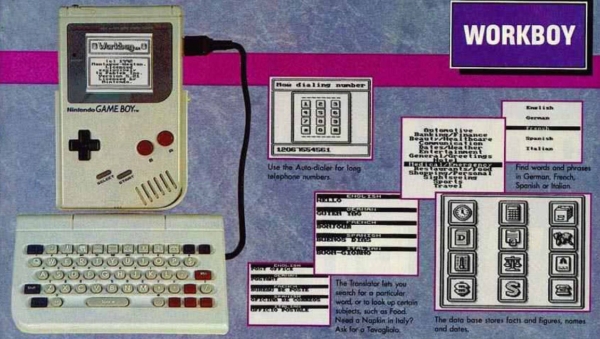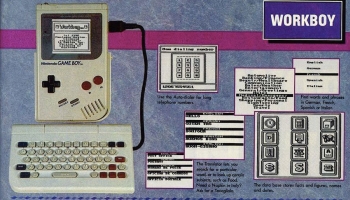
Liam Robertson was very busy this past year. The journalist produced multiple new videos for his Game History Secrets series, uncovering the facts about unreleased passion projects such as the fabled WorkBoy peripheral, Midway’s This Is Vegas, and Radical Entertainment’s The Simpsons: Hit & Run 2.
While the latter two games share a common lineage with Rockstar’s explosive Grand Theft Auto franchise, the discovery of the WorkBoy is no less exciting. So let’s travel back in time and learn more about two massive open-world adventures and an organizer for your Game Boy.
 Insert Quarter is a glimpse into gaming’s past, present, and future through an exploration of historical, retrospective, and contemporary reporting.
Insert Quarter is a glimpse into gaming’s past, present, and future through an exploration of historical, retrospective, and contemporary reporting.
The WorkBoy was the subject of an infamous two-page spread in Nintendo Power’s May 1992 issue, which promised to turn the humble Game Boy into a powerful mini-laptop. It wasn’t a new Mario game or a sprawling RPG, but the articles showed readers (many of whom were children) what else Nintendo’s little handheld could do.
Many people assumed the WorkBoy was quietly released shortly thereafter, just another rare peripheral with a small production run (and not something you’d run across at your local game store). But due to a combination of factors, the productivity software was canceled instead. During Robertson’s quest to track down the WorkBoy, he talked to the developers at Source Research and Development and also managed to boot up a WorkBoy prototype on an actual Game Boy.
That’s somewhat of a happy ending, but the real legacy of the WorkBoy is that it served as a direct inspiration for the modern smartphone. An engineer on the WorkBoy project, Eddie Gill, licensed the peripheral to Nokia, which used his design as the basis for their 9000 series of cell phones.
With funds depleted, Square famously took a chance on a “final fantasy” in the late 80s, and their success with 1987’s Final Fantasy gave them the capital to produce sequel after sequel (after sequel after sequel after…) in the decades that followed.
In many ways, This Is Vegas was a similar sort of fantasy for Midway. The publisher gambled a lot of money on a game showcasing the glitz and glamour (and grime) of Vegas, but their big swing ultimately helped doom the company.
Midway spent the 2000s producing a slew of original games alongside collaborators like John Woo and Vin Diesel. This Is Vegas was being positioned as their biggest game yet and a direct challenge to the then-new Grand Theft Auto IV. Alas, it was not to be, and when Midway was forced to fold in 2009, This Is Vegas was one of the first casualties after WB Games took control.
Back in the late 90s and early 2000s, video games based on The Simpsons would often liberally borrow concepts and gameplay styles from other successful games. The Simpsons Wrestling appeared in early 2001, aping the popular WWF and WCW titles of the day, while The Simpsons Skateboarding pulled the same trick with the Tony Hawk games in 2002. Neither game was well-reviewed, and both sold poorly.
But in between was Radical Entertainment’s The Simpsons: Road Rage. A clear knockoff of Sega’s Crazy Taxi franchise, the consolemaker actually sued Radical (along with publishers Fox Interactive and Electronic Arts) for patent infringement. A settlement was eventually reached, but fans didn’t seem to mind. Road Rage garnered some good reviews and it sold several million copies across four platforms.
Even before the settlement was reached, Radical was hard at work on a sequel that eventually morphed into The Simpsons: Hit & Run… which proceeded to expand Road Rage’s taxi service into an open-world structure more akin to Grand Theft Auto III. But even with this expanded scope, Hit & Run ultimately became a compromise between the simplicity of Road Rage and the grander ambitions of the development team, which they hoped to explore in a sequel.
Robertson spoke to several members of the Radical team about the unproduced The Simpsons: Hit & Run 2, also revealing that Stormfront Studios’s Don Daglow was working on The Simpsons Adventure, a medieval RPG starring our favorite Springfieldians, at the same time. But like the Workboy and This Is Vegas, both fizzled out before they could be released:
What will Liam Robertson and Game History Secrets have for us in 2021? I’m not sure, but I can’t wait to find out.

